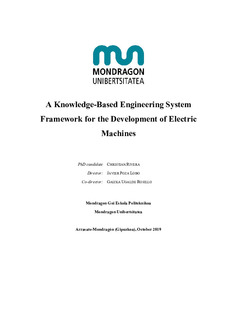Izenburua
A Knowledge-Based Engineering System Framework for the Development of Electric MachinesEgilea
Irakurtze Data
2019-12-16Eskubideak
© Christian Alejandro Rivera TorresSarbidea
Sarbide irekiaArgitaratzailearen bertsioa
https://doi.org/10.48764/q2y0-ce44Argitaratzailea
Mondragon Unibertsitatea. Goi Eskola PoliteknikoaGako-hitzak
Motores eléctricosInteligencia artificial
Diseño de maquinas
ODS 9 Industria, innovación e infraestructura
Laburpena
The new concept industry 4.0 is a great opportunity to improve the competitiveness in a global market for small-medium size electric machinery companies. The demand for electric motors have increased ... [+]
The new concept industry 4.0 is a great opportunity to improve the competitiveness in a global market for small-medium size electric machinery companies. The demand for electric motors have increased in the last decade especially due to applications that try to make a full transition from fuel to electricity. These applications encounter the need for tailor-made motors that must meet demanding requirements. Therefore, it is mandatory small-medium companies adopt new technologies offering customized products fulfilling the customers’ requirements according to their investment capacity. Furthermore, simplify their development process as well as to reduce computational time to achieve a feasible design in shorter periods. In addition, find ways to retain know-how that is typically kept within each designer either to retrieve it or transfer it to new designers.
To support the aforementioned issue, a knowledge-based engineering (KBE) system framework for the development of electric machines is devised. The framework is encapsulated in the so-called KBV2-model comprising the standardized macro-level framework for electrical machine and the knowledge base generation process. This thesis describes this model and the integration of KBE applications with current industrial technologies such as Model-Based Systems Engineering (MBSE), Product Lifecycle Management (PLM), multiphysics and analytical design tools. This architecture provides capability to manage and automate tasks in the development process of electric machines.
The author of this work has opted to develop KBE applications following the minimum viable product principle. The KBE system framework herein presented is formalized through the experience and analysis of the development and implementation of the KBE applications. From which a guideline is provided following a sequential process in order to achieve a viable KBE system. To substantiate the process a KBE system is created that supports the development of electric motors for the elevator system industry. [-]
Bildumak
- Tesiak - Ingeniaritza [229]






















